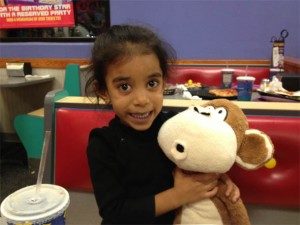Parents forget child at Chuck E Cheese: 10 parenting tips for safety and preparation
 I can’t believe I’m saying this…Parents are forgetting their kids at the children’s play place, Chuck E. Cheese’s. While this may sounds like the makings of a Saturday Night Live skit to you, it’s actually the truth. Yesterday, Good Morning America called me to do a piece (which was squashed at the final hour) about a 5 year old girl who was left at Chuck E. Cheese’s last week.
I can’t believe I’m saying this…Parents are forgetting their kids at the children’s play place, Chuck E. Cheese’s. While this may sounds like the makings of a Saturday Night Live skit to you, it’s actually the truth. Yesterday, Good Morning America called me to do a piece (which was squashed at the final hour) about a 5 year old girl who was left at Chuck E. Cheese’s last week.
It happened on Thursday night when the child was left at Chuck E. Cheese’s immediately following her own birthday party. One of 10 children in a family, she was left behind by her mother—it wasn’t discovered that she was missing until the following day when her mother realized the girl wasn’t in her bed (she as getting her up for school). Sounds completely implausible, right?
Perhaps. But when 3 adults were attending the event with 19 children—things can get pretty hectic. Was there a miscommunication of who was taking the child home? Did everyone assume someone else was taking care of her? We don’t know. The girl is now in protective custody until they determine what really happened here.
 But, believe it or not, this has happened before to other parents. In fact, it just happened last Monday to another family! Three-year-old Harmony was left behind by her parents at a Chuck E. Cheese’s restaurant in Bel Air, Maryland. They only realized that they had forgotten her when they saw a report about her on the evening news. Apparently there have been other cases of this in other areas as well.
But, believe it or not, this has happened before to other parents. In fact, it just happened last Monday to another family! Three-year-old Harmony was left behind by her parents at a Chuck E. Cheese’s restaurant in Bel Air, Maryland. They only realized that they had forgotten her when they saw a report about her on the evening news. Apparently there have been other cases of this in other areas as well.
Were the children misbehaving? Were the parents trying to employ the safe haven rule at Chuck E. Cheese’s? No. Parents haven’t left their kids there because they were at their wits end, they were leaving them there…by mistake.
I know. It’s ridiculous. How can people forget their child…let alone in a place that they attended for their children? But if you had 10 children…if it was a big crowd…if you made assumptions about who was picking up or dropping off your child…if you were exhausted or fed up or had a headache…could it happen to you or someone you know?
Whether you think so or not, this does beg some tips about parenting in a large, chaotic play place.
(1) Ensure that you have enough adults: When you have 19 children at a range of ages (some very young) and only three adults, you are out sorely outnumbered. There needs to be enough adults to ensure the safety of the children—especially when they may all be heading in different directions.
(2) Have an exit strategy: When you are dealing with multiple children, make sure every child and every adults knows where to meet, who they are going with, and how to check in with the adults.
(3) Make sure everyone knows the rules: Before entering a large play place, talk to your children about the safety rules. Even though this place is devoted to having fun, safety must come first. Young children must be attended to at all times—they must be able to see you and you must be able to see them.
(4) Do a headcount: When you first walk in, periodically throughout the play time, and upon leaving and getting into the car, do a head count. Not sure if everyone is there? Roll call!
(5) Pair up buddies: Another safety precaution is assigning buddies. When each child has another person they must keep track of and who must keep track of them, it adds another layer of security. When you call out “buddies!” everyone finds their buddy or, alternatively, can tell you that they don’t know where their buddy is at the time. You can pair up friends—but
(6) Appoint adults: When hosting a big group, each adult should be appointed to certain children such that the same people who came in the car on the way there should be the ones who return in that same car on the way home (unless explicit conversations and logistics beg otherwise). When children pour into cars without thought, assumptions about the whereabouts of certain children can be made.
(7) Teach basic safety: Just like we discussed in the attempted Walmart kidnapping recently, each child should know how to protect him or herself. Who should s/he go to if s/he is lost? What if s/he is approached by a stranger? What if someone tries to take them away from the play area or outside through coercion or force?
(8) Teach life-saving personal information: Every child should learn basic facts about him or herself at a very early age. For example, my daughter just turned 3 and already knows her full name and her street address. If she needs it, she has it. You can easily start to teach this to a young child by saying your address each time you approach your home—break it down a little at a time. It can become a game of 20 questions—what number house do we live at? What street do we live on? What color is our home? What town do we live in? Then teach him or her when to share the information and who s/he can share it with—and who s/he shouldn’t!
(9) If you can’t handle it, don’t do it: Think it sounds overwhelming to take a group of children to a large play area without more help? Listen to your gut and don’t do it. Even taking care of 2 young children in a large play area can be challenging if they go in two different directions—so know your limit and be sure you have enough back up.
(10) Recheck: At the end of the day, before leaving any venue with your family and friends, check and recheck that you have everyone! Make no assumptions.
When Good Morning American did their preliminary interview with me, they asked if only bad parents would leave their child somewhere such as Chuck E Cheese’s. I can’t make assumptions about the character of any of the parents who have done this—but I can say that parenting begs incredible organization, preparation and attention. In this case, these areas failed.
As parents, we will all make some mistakes. I’ve had very smart friends who thought the other parent was home and left their children to run an errand for a short time. I’ve had friends who thought the other parent was picking up their child from school and didn’t. Strange things can happen.
The Chuck E. Cheese’s situation pushes this to the limit considering that the parents didn’t know the child was missing until the next morning. To that I say, check beds, kiss heads and make sure you KNOW where every one of your young, school-age, or pre-college age children are when you turn out the light at night.
What do YOU think? Has anything like this ever happened to you?

